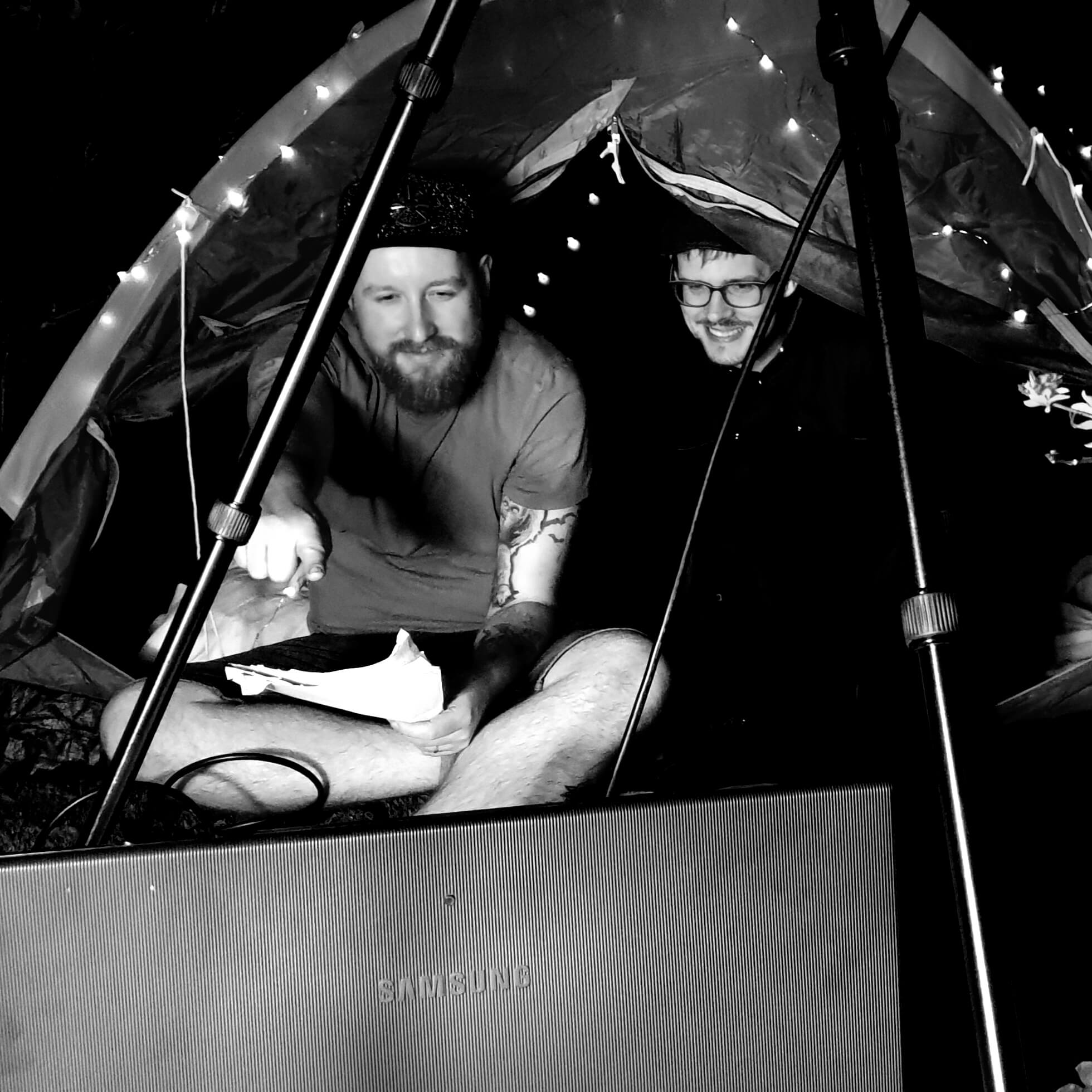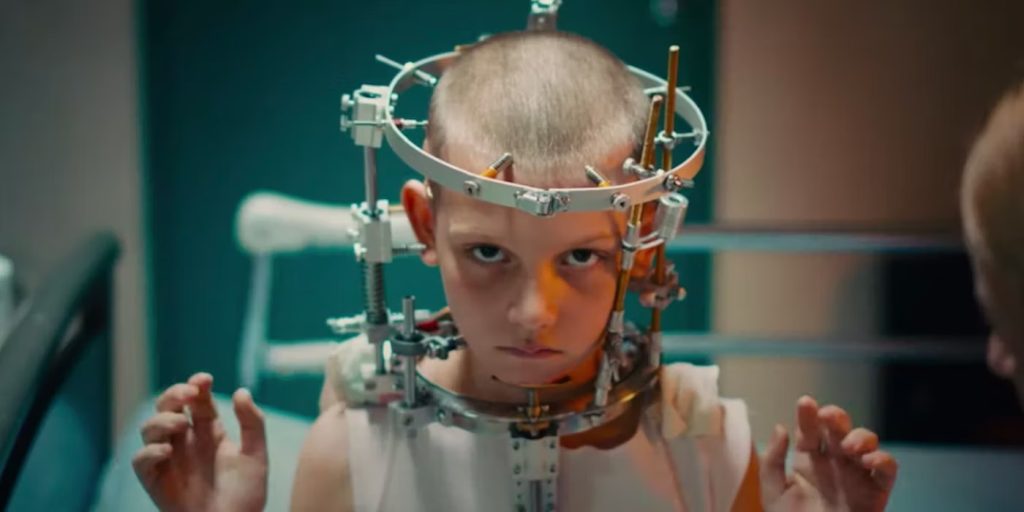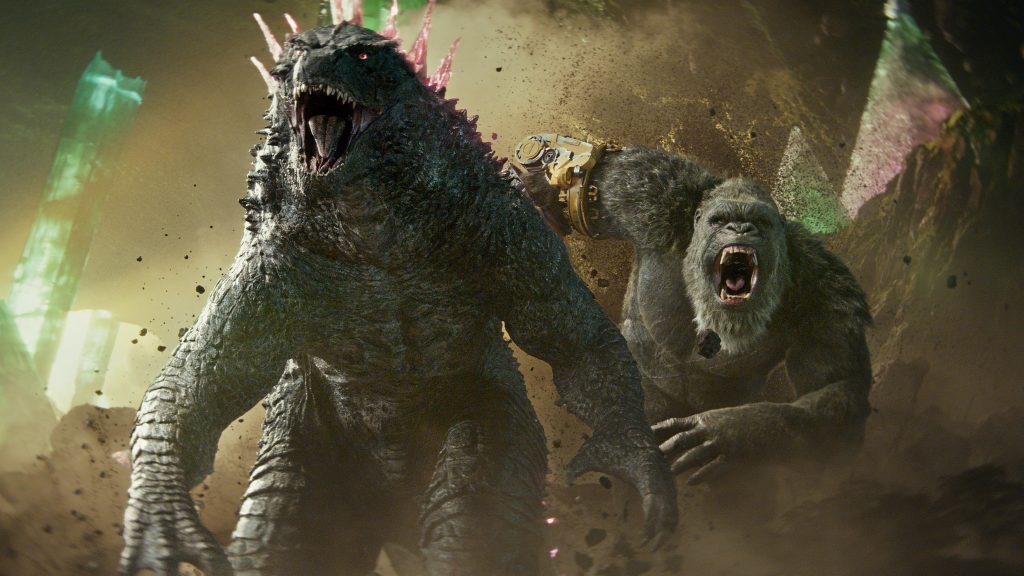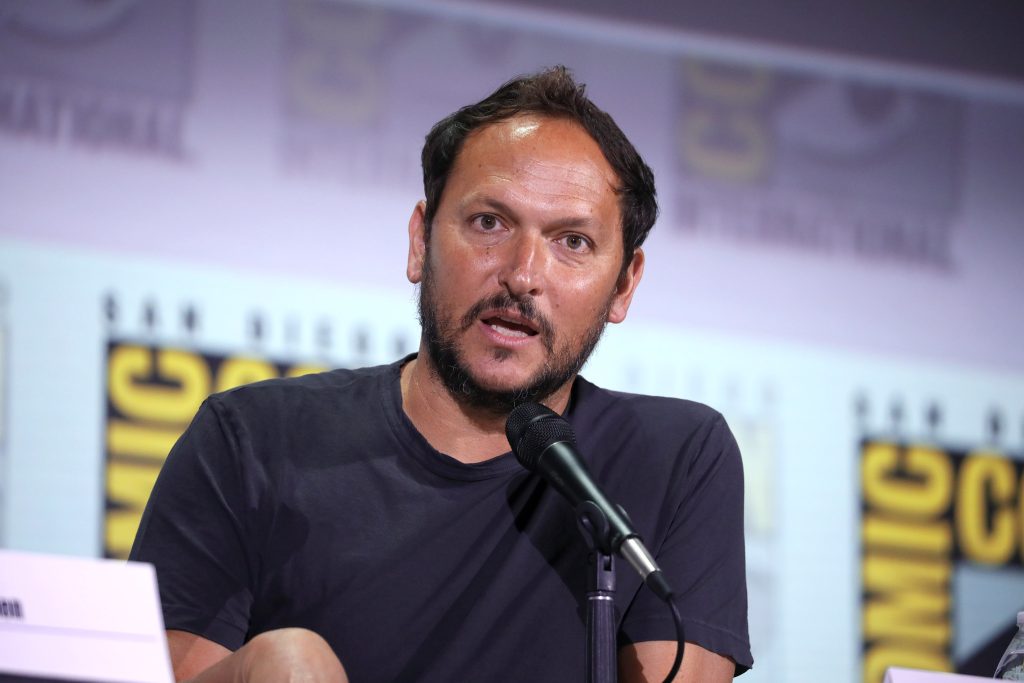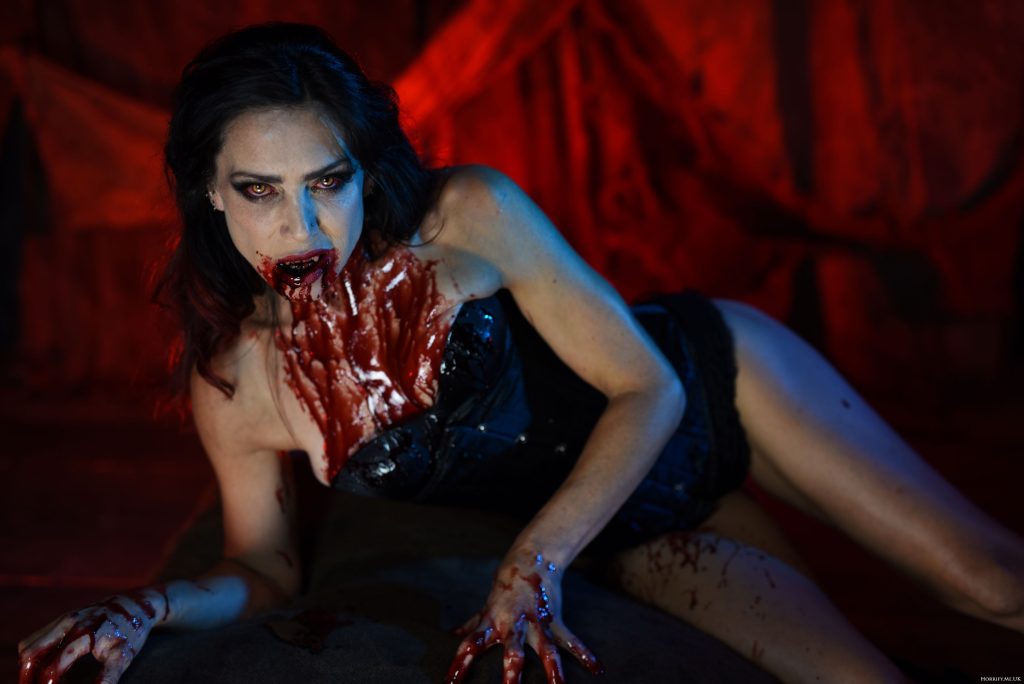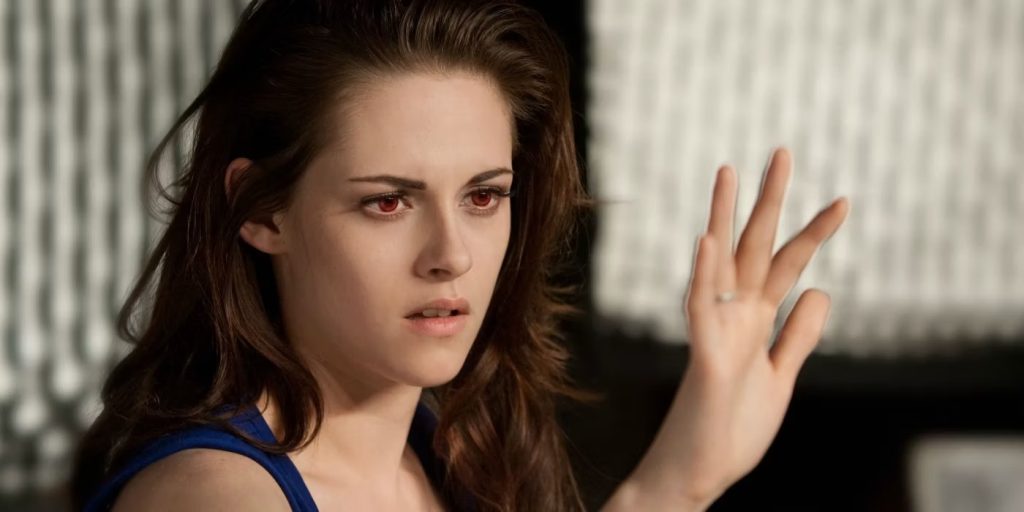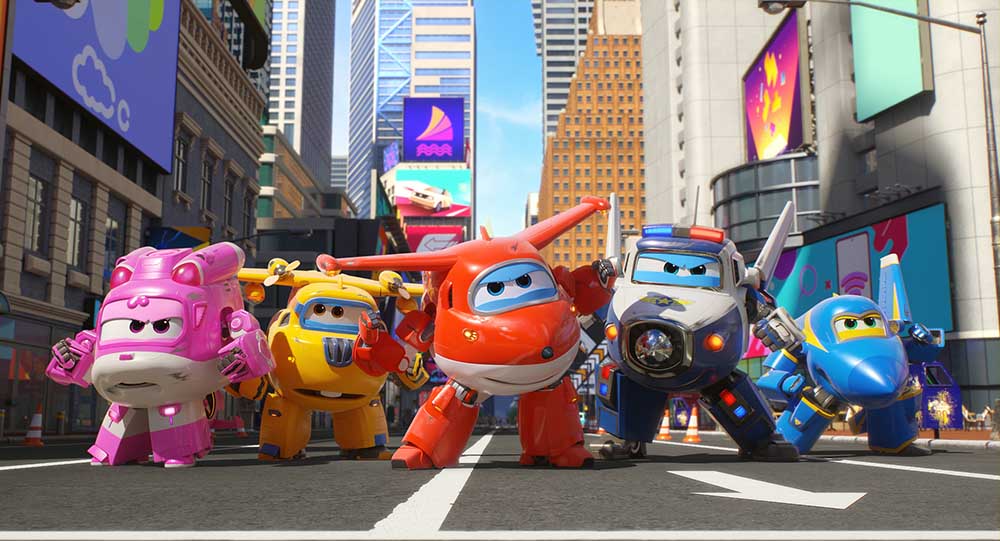A love-letter to the dodgy old-school slasher flicks that you’d find in the darkest corners of your local video store, I SCREAM ON THE BEACH! has been delighting audiences since its arrival on the festival scene earlier this year. We recently spoke to the madmen behind the movie about the road to making their debut feature; gateway horror; advice to aspiring filmmakers; and much more…
STARBURST: You bump into super-producer Jason Blum in a lift, you’ve got a captive audience until he gets out at floor 13, how do you pitch him I Scream on the Beach?
Alex Churchyard: Okay, so it’s an ‘80s horror film set in a UK coastal town, and it’s made to look as if you’re watching a VHS tape, deliberately playing into being a low-budget slasher.
Michael Holiday: The story follows a young girl called Emily who saw her father murdered when she was a child, but his body was never found, and no one believes her…
Alex Churchyard: …Ten or so years later that’s still the case, but as she investigates what happened to her Dad, people start dying again…
Michael Holiday: …At the hands of a gasmask-wearing killer who’s on the loose! Think seagulls, conspiracies, a banging synth soundtrack, lots of decapitations, and Lloyd Kaufman’s floating head. Who are we kidding, Jason Blum is calling security if we ever try to pitch this.
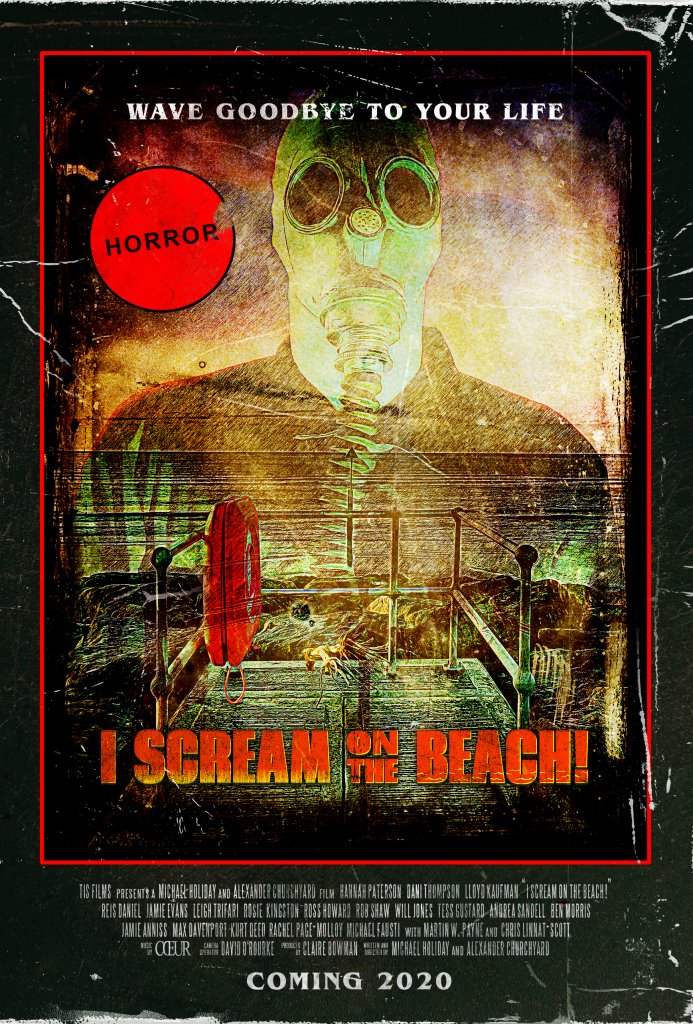
How did the idea for ISOTB come about?
AC: Essentially, when I was about twelve, my brother and I would make these short films on our Tyco Video-Cam based around this central idea of an unseen killer that turns out to be something quite unexpected. I met Mike when I was about 17, and I roped him into making a few more of these shorts. Years later, I wrote a feature-length version; it was more of a ‘90s-style slasher set in the present day that revolved around college students. Mike and I then decided to turn that idea into I Scream…
MH: The script ended up being almost unrecognisable from how I Scream turned out. But without giving too much away, that initial draft gave us a clear idea of how we wanted the film to end, so we worked backwards from there. We knew we would be working with a tiny budget for this, so we decided to think about what assets we had available. In terms of location, we both happen to live in a seaside town, which for whatever reason is a location we’d never properly utilised before. We are also both huge lovers of ‘70s and ‘80s horror, which obviously ended up being the direction we went with in terms of period and style for the film. We had this basic concept of an American-style slasher film set in such a quintessentially British location, and it kind of snowballed from there.
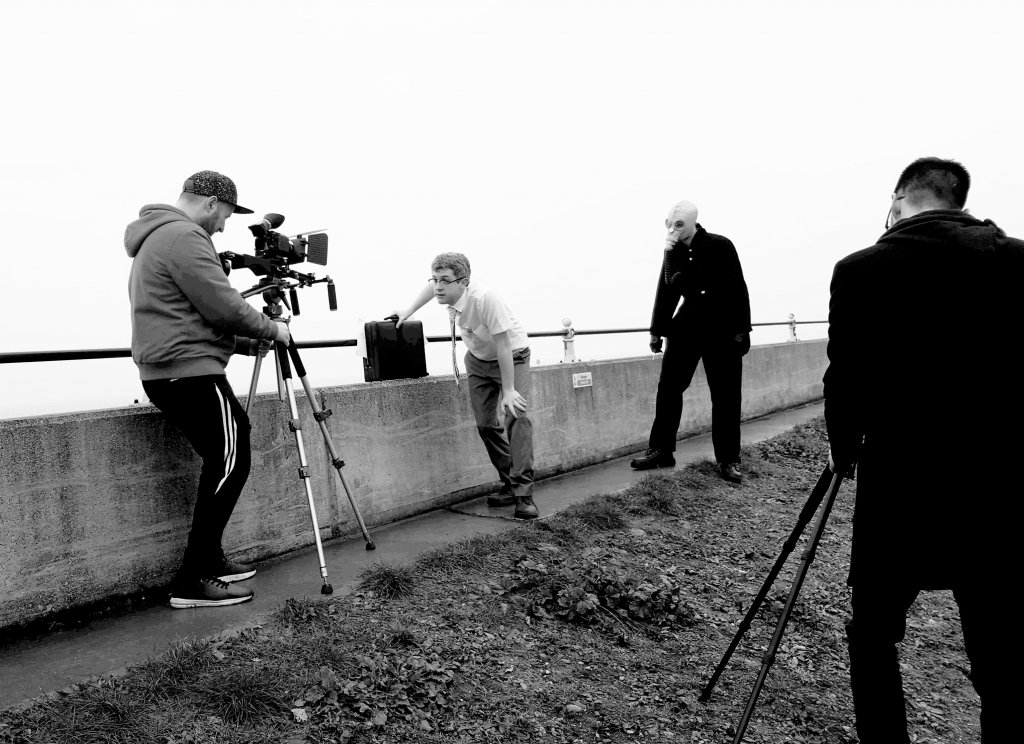
Behind the scenes on I SCREAM ON THE BEACH!
You mentioned that it was a tiny budget you were working with – could we ask how small exactly?
MH: Whatever you think it is, it’s probably lower. Honestly, I’m not sure I could even tell you. We started the initial shooting of this film back in 2016, then life got in the way and we didn’t start again until 2019.
AC: We never set an exact budget, but we filmed in blocks for several weekends over a three-month period – so half the time it was just figuring out how much money we had that weekend to feed people and pay for travel, etc. Charity shops were our friends for costumes; we figured out most of the FX ourselves – and if not, then one of our makeup artists did – and we just kept everything very small behind the scenes.
MH: A fair bit of the equipment was either stuff we’d put together over the years or went on my credit card. Luckily, both being editors by trade we’ve made quite a few friends who are filmmakers who happily lent us a few bits and pieces – shout out to our camera operator David O’Rourke for a lot of that!
AC: Yeah, we just used what we had at the time money-wise, so the budget basically came from Mike and I’s earnings. Hill Burton did come on as an Executive Producer towards the end of the shoot and some of that money was vital in helping us finish.
Not only was the film co-written by yourselves, but you co-directed it too. Bearing in mind that this is still somehow considered unorthodox – unless the directors happen to be brothers, in which case it’s totally normal for some reason – how did you arrive at the decision to tackle ISOTB this way?
MH: I don’t ever remember this being a big discussion, we just kind of immediately fell into it. When it came to the writing, Alex had written that very early draft by himself, and then we just started meeting up together to hash out ideas from then onwards. We were both working together full-time as Editors, and when we’d finish up for the day we’d often head to the local pub and start writing with Alex typing on a keyboard and me shouting stupid ideas while having a beer.
AC: I think there’s a sense that we’d done quite a lot of stuff together, so it didn’t feel too strange to direct our first feature together. We felt that it needed to be both of our visions.
MH: When it came to actually directing, we tried to split the role into different areas. The idea was that Alex would deal directly with actors and I would handle the technical side of filming. This didn’t mean we were solely responsible for those areas, but it just helped make things clear on set. If Alex wanted to do something different in terms of how a shot looked, he would talk to me and I’d control the crew for that side of things. If I had notes for an actor, I’d talk to Alex about that and he’d talk to them. It sounds a little convoluted, but it meant each person on set knew who to talk to, so there was no confusion on that side of things.
AC: There were definitely times making it where if I’d been alone, I really don’t know what I’d have done.
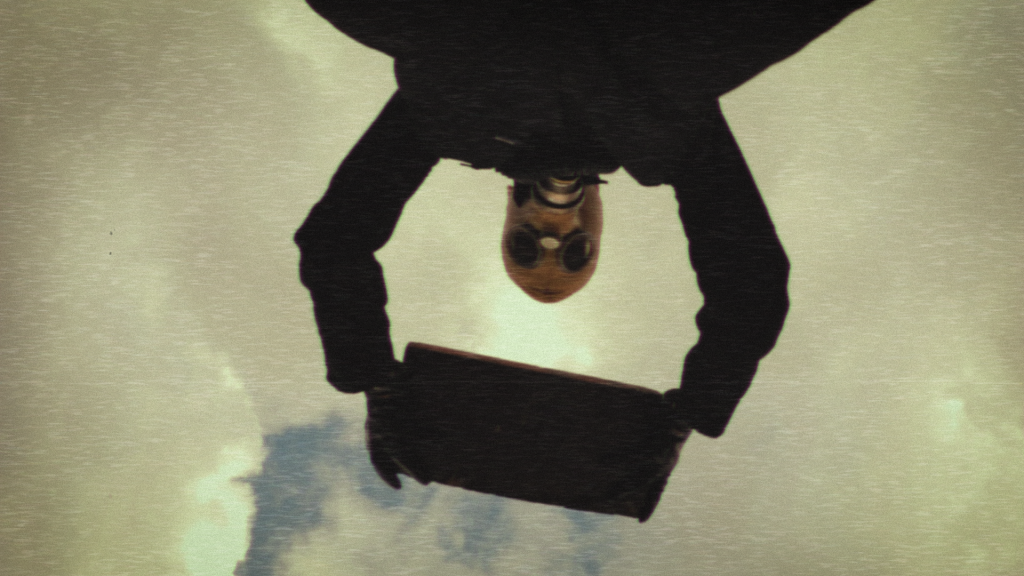
As you were telling Jason Blum earlier, the film has a delightful aesthetic that pays loving homage to low budget filmmaking, warts and all – was this as creatively freeing as it looks?
MH: Yes and no. Creating the aesthetic was by far my favourite part of the film. I think the fun creative side of it was actually how specific it was. We weren’t trying to create Halloween or A Nightmare on Elm Street, we were trying to create the weird bargain bin VHS tape you might have found back then that no one had ever heard of. So I think that gave us a lot of freedom to make the whole thing look a bit chaotic and messy; to be creative and just have fun with it. Adding in surreal dream sequences, floating ghostly heads, murders that on a physical level probably don’t make any sense. However, the flip side of that was that because we set it in the ‘80s, it was important to us that everything felt authentic to that period. But trying to do that on an extremely limited budget is very challenging!
AC: Yeah, the VHS look allowed us to let our mistakes appear like deliberate decisions, which was handy! And for me, I liked the idea that we just couldn’t have enough crash zooms on characters looking shady. With effects, you can be less precious if they don’t come off quite how you wanted as well. However, sometimes you’d get shots that looked really nice in the raw footage, and to some degree you’d feel sad about having to make them look like grainy VHS.
In replicating these imperfections were there any aspects that proved surprisingly tricky to pull off?
MH: Initially, to get that feeling of authenticity we were actually planning to run the entire film through an actual VHS player. We’d seen so many films do the ‘old film’ look where everything still felt so digital and we didn’t want I Scream to suffer from that. However, the technical process behind this ended up getting increasingly complicated and we ended up having to abandon it. We did end up using VHS scans to create the effect in post though, so – we hope – it still feels like the real deal.
AC: I think it’s also tricky with the actors to some degree, as some performances need to come off a certain way that might not be instinctively the way an actor would want to go. I think our first instinct was that everyone in the film should be very wooden, but intimately I think we have an interesting melody of characters and actors which might be truer to the films we’re referencing in a way.
MH: We tried to make all of the effects as practical as possible too, which, while great fun, produced its own challenges. Especially when trying to film on an English beach in winter. Did you know blood bags can turn into a weird jelly when they get too cold? Because we didn’t until we were trying to slit someone’s throat on a windy beach.
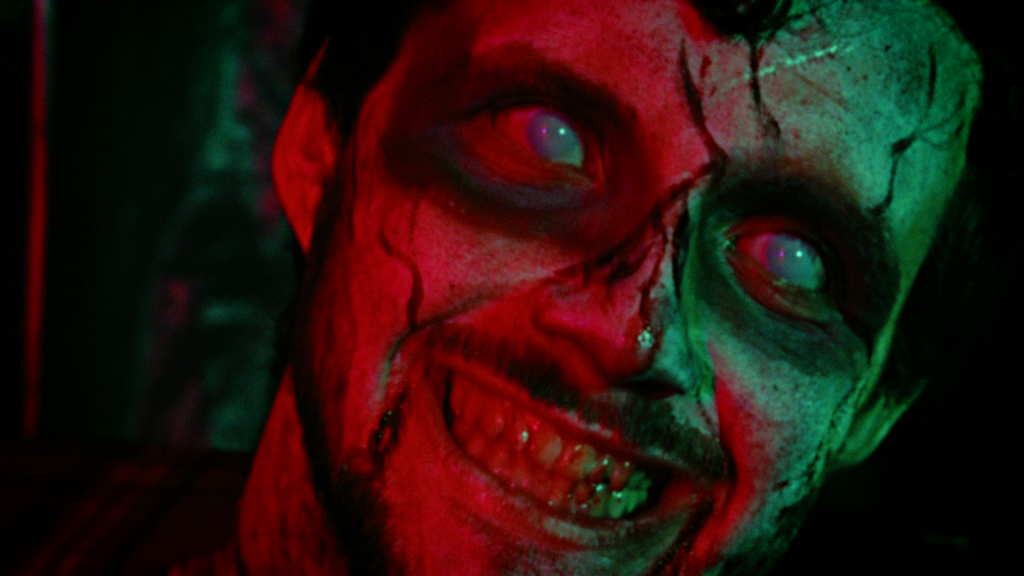
This is your first feature, but what kind of film projects came before it?
MH: During our time in university we made quite a few shorts. Alex had a bit of attention from a documentary he made towards the end of uni, but after that we both kind of stepped away from it for a long time. As we mentioned before, we both started working as editors for a company but that was focused on educational content, so wasn’t really the same thing. I Scream ended up being this dream project we had on the back burner; the thing we had on a laptop somewhere that we kept saying one day we’d actually make. I think for the longest time it just kind of felt like something to daydream about but wasn’t ever going to happen. We’d go to film festivals together occasionally, and one in particular was in our hometown, called ‘Horror-on-Sea’. Each year we’d go and say next year we’ll enter something of our own into it. As the 2019 festival approached, I was fed up of not doing anything creatively to contribute to it. So, I made a short film called The Ratman of Southend. It was just a little local ghost story and I made a simple short that I could shoot in a day and edit during my lunch breaks. I didn’t expect it to get into the festival; I just did it as an outlet to be honest. That was the first time in nearly 10 years I’d made something that was shown to any kind of audience and I think that was one of the things that made us both say ‘right, screw it – let’s stop being wimps about this and just give it a go’. I think a month after the premiere of Ratman we were sat on set for I Scream.
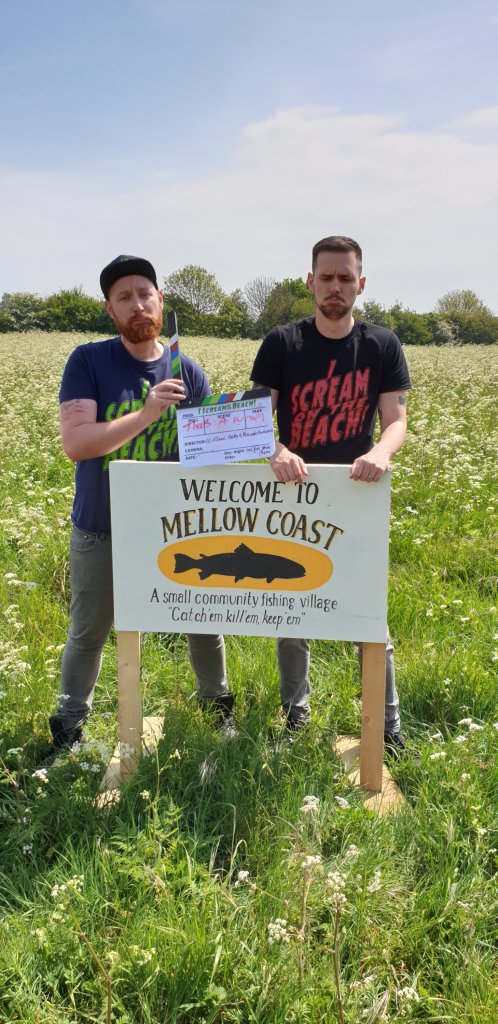
Alex & Michael on the set of I SCREAM ON THE BEACH!
Have you both always wanted to be involved in the industry?
AC: I’ve wanted to be involved in film since I was very young, maybe 10 or 11. I used to do faux radio shows with my cousin which we’d record on his Talkboy – as seen in Home Alone 2 – which I think was one of my earliest avenues for creating stories.
MH: I distinctly remember being about 10-years-old in school, me and my two best friends would always talk about horror films – even though I was never allowed to see any! Scream had just come out and we decided we were going to make our own ‘Scream film’; we had no camera so it was just three children running around a playground pretending to stab each other while I shouted out things I thought a director would say. Then in high school, in our final year, as a project, our drama teacher let me and a group of friends make a film. They didn’t give us any real restraints beyond it being about the school, so we made a mockumentary about a film crew coming to the school who don’t realise that all the teachers are actually killing off the pupils. I’m surprised we got away with that, but apparently they still show it to students occasionally, so that’s nice.
We’ve touched on the Scream series being an early influence on you, Michael – how about you, Alex?
AC: Buffy the Vampire Slayer. I was obsessed by it and wished I could write on it. Similarly,Scream also. I think with both I reacted to how self-aware they were and I loved that. Scream was my gateway into discovering a lot of the horror films it referenced and ignited by own love for horror.
MH: My mum was super strict about letting me watch horror films when I was younger, but she did let me have a TV in my room, and I mostly just stayed up watching comedy shows on Channel 4. But, quite often, they’d run programmes about films some nights. Then around the late ‘90s, early 2000s, there was this sudden surge of previously banned or censored films being re-released. I distinctly remember stumbling across a programme on film censorship, that I think maybe Mark Kermode presented, so I was suddenly flooded with all these images from the likes of The Exorcist, A Clockwork Orange, Funny Games, A Nightmare on Elm Street. Which was all pretty traumatising! But the one that really stuck with me was seeing Leatherface appearing from behind that metal door, hammer in hand, in The Texas Chain Saw Massacre. I don’t think I slept for a while. That film just felt like something I’d never experienced before. It felt so real. It felt dangerous. Like people shouldn’t be allowed to watch the film. It took me years to finally pluck up the courage to watch it – I even had to watch the remake first because it felt ‘safer’! But I think that film cemented filmmaking for me as a passion. To this day it’s still one of my favourite films and shows off how powerful and impactful cinema can be, regardless of its budget or who stars in it.
Independents Day is very popular with readers who aspire to get their own projects off the ground and on to our screens so, as established award-winning filmmakers yourselves, we’d like to get your quick thoughts on an age-old question: should they go to film school?
MH: I think this is a tricky question to answer. Neither of us went to film school specifically, but we did study film production at both College and university. In terms of me getting a job, I think having that degree helped me get a foot in the door as an in-house video editor. But I really didn’t enjoy my experience at university. I was possibly a little too immature at the time to make the most of it. Either way, I felt I learned more in six-months of filming and editing professionally after uni than I had done in my four-years of education. This is going back about ten years now, so things have obviously changed a lot. There are just so many free resources online! The amount of times I think I’ve used YouTube to learn how to do something in both my day job and while making I Scream is ridiculous.
AC: Uni was fun at times, we made some stuff that was alright, but I think we could have made ISOTB without degrees. And people are now growing up with Adobe Creative Suite on their PCs and phones that are more capable than the entry-level cameras I had access to at their age.
MH: You don’t have to put yourself in debt anymore to learn how to make films.
I know it’s such a cliché to say now, but it’s a fact that you can make a film on your phone which is just mind-blowing to me. So personally, I’d just say get out there and start making films, make anything! You don’t even have to show anyone if you don’t want, just start making things and you’ll learn the basics pretty damn fast. If, after a couple of years of doing that, you feel like you’re still missing out on something, then sure, maybe look into film school. But to begin with, I’d personally weigh up if it’s worth the cost anymore.
Great advice. So, once they’ve made their first project and are looking for an audience, film festivals can be very costly to enter, especially at such an early career stage when, let’s face it, everybody’s skint. Conversely, the straight-to-YouTube route is free, but prohibits filmmakers from entering the majority of events. Drawing on your own experiences, where do you stand on the festival vs online debate?
AC: I love festivals; coming together with like-minded people, viewing other people’s awesome projects and seeing an audience react to yours. I think online content is great too, but I’d prefer to try and get into festivals – you can’t beat seeing your film on a big screen with an audience. It can be costly though, as you say, so speak to other filmmakers, do some research – I like to look at their social channels and see how much promotion they do, and how much interaction with the filmmakers they have as well.
MH: Personally, for us, I think online was never an option we seriously considered. We made I Scream on the Beach specifically for a horror film festival audience. I wasn’t sure how well it would translate to an audience outside of genre fans when we first put it out there. Plus, it’s so damn stupid that I think it’s best enjoyed with an audience, ideally one that’s had a few drinks. Putting a film out online isn’t just a case of uploading it and that’s it. It can become a full-time job trying to get the word out there, pushing people towards the film. Especially if you don’t have an advertising budget to work with. But on the flipside, the potential audience is basically limitless. So, I think it depends on your project, but it didn’t feel right for us for this. But that doesn’t mean we wouldn’t go that route in the future.

What can you tell us about your next projects?
MH: COVID-19 has been a massive spanner in the works in terms of getting the ball rolling too much on projects at the moment, but we do have a bunch of things in the works…
AC: The imminent future for our company – TIS Films – is shorts. Up first are Miaow with actor/filmmaker Martin W. Payne that we hope to shoot later this year, and we’ve recently shot a horror short called The Allotment, which is currently in post-production. With regards to features, we’ve got a horror anthology titled Mosiac, and we have plans to spin-off The Decorator – which is the film-within-a-film in ISOTB – and an idea for a sequel to ISOTB itself, I Scream Parlour.
Great title!
MH: I’m also on a second draft of a feature called The Wolf Will Hunt, which is going to be drastically different to ISOTB.
We’re back in the lift, Blum loves your pitch for ISOTB and agrees to check out the screener. That night, your phone rings and it’s Jason. He loved it and you’re on first name terms now. He offers you a gig remaking or rebooting a genre film or franchise of your choice, because in this timeline Blumhouse now owns everything. What project do you pick and why?
MH: Hellraiser. I would make a batshit insane Hellraiser film. The world is really lacking sexy hell films these days.
AC: Personally, I love A Nightmare on Elm St, and I feel like that has the most scope to do something visually different – nightmares can be literally anything, right! I still love the premise of Freddy vs. Jason, and the idea of some crazy team-up with Freddy, Jason, Pinhead, Chucky, etc, would be way too tempting in a world where one studio owns all that IP! Fuck it. All those characters vs. the classic Universal Monsters!
To keep up to date on where you can see I SCREAM ON THE BEACH! and their many other upcoming projects – including the IndieGoGo campaign for the anthology feature, MOSIAC – follow them on social media @ISCREAMBEACH, or head to WWW.TISFILM.COM
[This article originally appeared in Issue 474 of STARBURST Magazine. If you missed it, you can still get it through us while stocks last – grab one HERE.]

